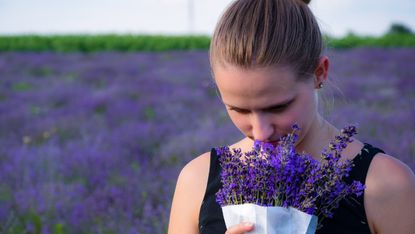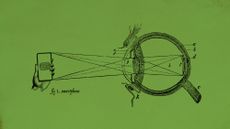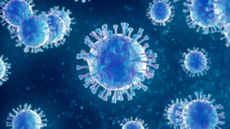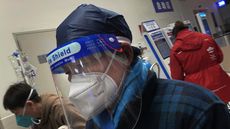How to regain your smell and taste after Covid-19
Potential treatments include ‘smell training’ to remind the brain or taking steroids

Millions of people worldwide are trying to adapt to life without smell and taste after being infected with Covid-19.
For the majority, this olfactory dysfunction lasts for just a couple of days or weeks, but some are still suffering months after contracting the virus. A study last year found that between 700,000 and 1.6 million people in the US had lost or had a change in their sense of smell for more than six months after having Covid.
And the authors of the study – published in the Jama Network Open journal – warned that these figures were “likely an underestimate”, reported CNN.
Subscribe to The Week
Escape your echo chamber. Get the facts behind the news, plus analysis from multiple perspectives.

Sign up for The Week's Free Newsletters
From our morning news briefing to a weekly Good News Newsletter, get the best of The Week delivered directly to your inbox.
From our morning news briefing to a weekly Good News Newsletter, get the best of The Week delivered directly to your inbox.
However, hopes have been raised after scientists said that a molecule found in coffee, typically described by people with smell distortion as “disgusting” or “repulsive”, could provide a breakthrough.
The causes
The “precise cause” of sensory loss related to the coronavirus is not known, said Sky News, but experts believe it is connected to “damage to infected cells in a part of the nose called the olfactory epithelium”. Cells in this area of the nasal cavity protect olfactory neurons that enable humans to smell.
A study published in the Nature Genetics journal in January suggested that genetics plays a key role in determining whether a person loses or experiences a change in their sense of smell and taste after being infected with Covid-19.
The analysis of DNA data on nearly 70,000 adults in the UK and the US with Covid found that those with “certain genetic tweaks” on a chromosome near two olfactory genes, called UGT2A1 and UGT2A24, were 11% more likely to lose the ability to smell or taste than people without the changes, explained Science News.
Sign up for Today's Best Articles in your inbox
A free daily email with the biggest news stories of the day – and the best features from TheWeek.com
The researchers suggested that the genetic variants “could affect how the two genes are turned on or off to somehow mess with smell during an infection”, the site said.
Trigger molecule
A related and lesser-known symptom of Covid is parosmia, where people experience smell distortion after contracting the virus. According to Fifth Sense, a charity for people affected by smell and taste disorders, an estimated 25,000 UK adults who have had Covid have been affected by parosmia, which “can mean food gives off an unpleasant odour or taste, such as rotten meat or chemicals”, said the BBC.
Scientists have identified a “highly potent odour molecule” that appears to be a trigger for the “sense of disgust” experienced by many of those with parosmia, said The Guardian. Those with a normal sense of smell found the molecule, called 2-furanmethanethiol, as smelling like coffee or popcorn but those with parosmia typically described its scent as “disgusting, repulsive or dirty”, said the report.
The study also found that those with parosmia could experience highly objectionable smells differently. Some described the smell of faeces as “less unpleasant or biscuity”.
Dr Jane Parker, the director of the Flavour Centre at the University of Reading and co-author of the research that was published in Communications Medicine, said this means parosmia can be related to the compounds in the distorted foods. She added that “the central nervous system is certainly involved as well in interpreting the signals that it receives from the nose”.
One of the researchers, Simon Gane, from the Royal National Ear, Nose and Throat and Eastman Dental Hospitals, said: “We now know this has to be something to do with the nerves and their receptors because that’s how these molecules are detected.”
Potential cures
Meanwhile, although there is currently no cure for parosmia, Fifth Sense and experts from the University of East Anglia have created an online guide for a “smell training technique” that advocates say may help anyone who has experienced a loss or change in their sense of smell.
The training normally involves sniffing at least four distinctive smells, such as oranges, coffee or garlic, twice a day for several months in order to retrain the brain to recognise different smells.
Another potential treatment for olfactory dysfunction is steroids – anti-inflammatory medicines used to treat a range of conditions from eczema to arthritis. Along with suppressing inflammation, they work by reducing the activity of the immune system.
Although steroids may cause increased appetite, mood changes and difficulty sleeping, they “do not tend to cause significant side effects” if taken for a short time or at a low dose, according to the NHS website.
Spontaneous recovery
Experts have argued that smell training is preferable to steroids for people suffering from a lack of smell and taste as a result of Covid. Professor Carl Philpott, of the University of East Anglia, described smell training as “a cheap, simple and side-effect free treatment option”.
He added that “luckily”, the majority of people who experience smell and taste loss as a result of the virus end up regaining these senses “spontaneously”.
Create an account with the same email registered to your subscription to unlock access.
-
 Shardlake: a 'tightly plotted, gorgeously atmospheric piece of television'
Shardlake: a 'tightly plotted, gorgeously atmospheric piece of television'The Week Recommends Arthur Hughes captivates in this 'eminently watchable' Tudor murder mystery
By Irenie Forshaw, The Week UK Published
-
 Major League Baseball is facing an epidemic of pitcher's injuries
Major League Baseball is facing an epidemic of pitcher's injuriesUnder the Radar Many insiders are blaming the pitch clock for the rise in injuries — but the league is not so sure
By Justin Klawans, The Week US Published
-
 8 movie musicals that prove the screen can share the stage
8 movie musicals that prove the screen can share the stageThe Week Recommends The singing and dancing, bigger than life itself
By Scott Hocker, The Week US Published
-
 Covid four years on: have we got over the pandemic?
Covid four years on: have we got over the pandemic?Today's Big Question Brits suffering from both lockdown nostalgia and collective trauma that refuses to go away
By Chas Newkey-Burden, The Week UK Published
-
 The hollow classroom
The hollow classroomOpinion Remote school let kids down. It will take much more than extra tutoring for kids to recover.
By Mark Gimein Published
-
 Excess screen time is making children only see what is in front of them
Excess screen time is making children only see what is in front of themUnder the radar The future is looking blurry. And very nearsighted.
By Devika Rao, The Week US Published
-
 Covid-19: what to know about UK's new Juno and Pirola variants
Covid-19: what to know about UK's new Juno and Pirola variantsin depth Rapidly spreading new JN.1 strain is 'yet another reminder that the pandemic is far from over'
By Arion McNicoll, The Week UK Published
-
 Long-term respiratory illness is here to stay
Long-term respiratory illness is here to stayThe Explainer Covid is not the only disease with a long version
By Devika Rao, The Week US Published
-
 Covid inquiry: the most important questions for Boris Johnson
Covid inquiry: the most important questions for Boris JohnsonTalking Point Former PM has faced weeks of heavy criticism from former colleagues at the public hearing
By The Week Staff Published
-
 China's pneumonia cases: should we be worried?
China's pneumonia cases: should we be worried?The Explainer Experts warn against pushing 'pandemic panic button' following outbreak of respiratory illness
By Keumars Afifi-Sabet, The Week UK Published
-
 Vallance diaries: Boris Johnson 'bamboozled' by Covid science
Vallance diaries: Boris Johnson 'bamboozled' by Covid scienceSpeed Read Then PM struggled to get his head around key terms and stats, chief scientific advisor claims
By The Week UK Published